'Tween Pavement and Stars
Tine finally rose from her sickbed this afternoon and ventured forth into the world at large.
"How long has it been since our last walk, Rubob?" Tine asked as they made their way down the driveway. "Has it been days or weeks, or even months?"
But Rubob, who was as lost in his thoughts as Tine was in her uncertain notions of time, didn't reply.
"Why are you trailing behind, Rubob?" Tine asked as they passed the open fields stretching up the hill in the old Bull Lot.
"You lead the way, Tine," Rubob said. "You're the shooter in our hunting party. I'd better be careful if a covey of quail breaks out of the brush behind us, or I'll get peppered with buckshot like poor old Harry Whittington."
Rubob had been absorbed in his newspaper for much of the morning, and his thoughts were still on the vice president's unfortunate hunting incident.
"Whittington -- wasn't there a Whittington in London?" Rubob asked.
"I don't know, Rubob," Tine replied.
"Dick Whittington, wasn't that it?" Rubob said. "He was a poor boy from Gloucestershire who walked to London to make his fortune."

"That's Gloss-ter-sher, Rubob -- not Glow-ster," Tine said.
"He becomes a scullery boy, and the cook makes his life so miserable that he decides to run away," Rubob continued. "But as he was leaving the city, he heard the bells of London ringing, and they seemed to him to say, 'Turn again Whittington, three times Lord Mayor of London.' So Dick returned to London, where, with the help of his cat, he makes his fortune."
"With his cat, Rubob?" Tine asked.
"As the story goes, Whittington had a cat to catch the mice in the attic where he lived. He sent his cat on one of his master's sailing voyages, and the cat was sold to a foreign king whose court was overrun with rats -- sold for a huge sum of gold. That's how Whittington began building his fortune. His adventures were the subject of pantomimes, and in one he's even portrayed as the 'Last Hope of the Universe’, who with his cat chases King Rat across the galaxy."
"That's a nice story, Rubob," Tine said, thinking to herself that it cheered her up a bit. Like Dick Whittington in his scullery in London, she'd been feeling miserable, weighed down by a long bout with the flu. Also on Tine's mind was the death of a high school friend, which she'd read about yesterday in the obituary pages. "We will all miss this kind and beautiful soul," the obituary had said. Tine was glad to be outside again in the fresh winter air. She let her gaze drift up to the rooftops, seeking release in the blue sky.
"Look, Rubob, chimney caps -- and not flimsy metal ones like ours, which get blown away in the wind," she said.

"And two chimneys, Tine," Rubob said. "I'd never noticed the two chimneys on that roof before."
"My thoughts are with the sky today," Tine said. "I can't be doing with all the sickness and trouble down here."
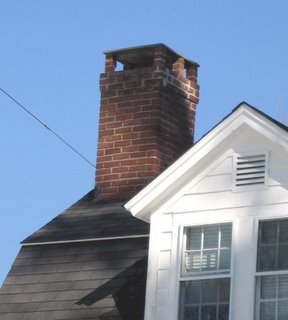
They passed another chimney with a well-built chimney cap, and Tine thought of a verse from Robert Frost's "The Kitchen Chimney":
"However far you must go for bricks,
Whatever they cost a-piece or a pound,
Buy me enough for a full-length chimney,
And build the chimney clear from the ground."
"They remind me of all the chimneys huddled on the rooftops in England -- of the view out the window of the bed-and-breakfast in Chester," Rubob said.
Tine thought of the chimneys in Dickens' London:
"The smoke hung sluggishly above the chimney-tops as if it lacked the courage to rise, and the rain came slowly and doggedly down, as if it had not even the spirit to pour."
It wasn't exactly Tine's view of chimneys, huddled together under a lowering sky.
"There's a garage with a chimney," Tine said. "Why do you suppose a garage would have a chimney, Rubob?"

"It's a mystery, Tine," Rubob said. "And why do you think that's one's built so high?"

"So it draws well," Tine said. "And to be close to the sky. It's had quite enough of the things of this world."
She thought of the poorly built "false" chimneys in Frost's poem:
"It's not that I'm greatly afraid of fire,
But I never heard of a house that throve
(And I know of one that didn't thrive)
Where the chimney started above the stove.
"And I dread the ominous stain of tar
That there always is on the papered walls,
And the smell of fire drowned in rain
That there always is when the chimney's false."
But the chimneys in the village inspired more uplifting thoughts in Tine. They seemed less concerned with smoke and fire than with the clear sky above, and they appeared to be as at home in the sky as the treetops.

The chimneys were like steeples, Tine thought as she and Rubob approached the Congregational church -- steeples built not just in worship of home and hearth, but in reverence for the sky.
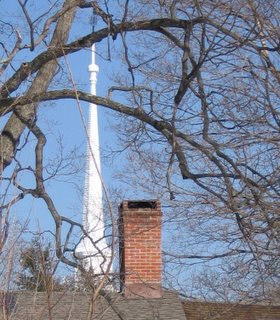
"There's a perky one with a half-barreled black cap," Rubob said, looking at a chimney across the main thoroughfare.
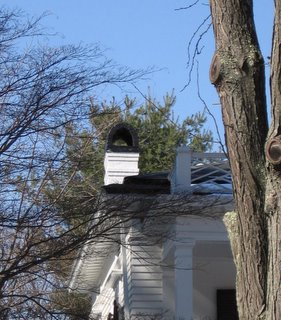
'Tween pavement and stars is the chimney sweep world," Tine said, recalling the Mary Poppins song, "Chim Chim Cher-ee."
"Chim chiminey
Chim chiminey
Chim chim cher-ee!
A sweep is as lucky
As lucky can be.
"Chim chiminey
Chim chiminey
Chim chim cher-oo!
Good luck will rub off
when I shake 'ands with you,
Or blow me a kiss
And that's lucky too.
"Now as the ladder of life
'As been strung
You may think a sweep's
On the bottommost rung.
Though I spends me time
In the ashes and smoke
In this 'ole wide world
There's no 'appier bloke.
"Chim chiminey
Chim chiminey
Chim chim cher-ee!
A sweep is as lucky
As lucky can be."
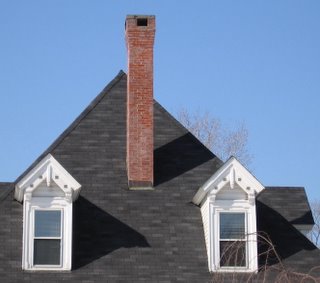
"I'd like to live up there with the chimneys," Tine said, pointing to a cupola on the roof of the library at Miss Porter's School. "That would be just fine for me."

"Or how about up there with that chimney, safely tucked between two windows, with a pleasant view of the sky?" she said, looking at the rooftop of a dorm at Miss Porter's School.

"Or there, in my own tower, far from the troubles of the world," Tine said.

"When I think of chimneys, I can't help thinking of Auschwitz," Rubob said.
Tine stopped in her tracks and said, "Auschwitz? That's what you think of when you see chimneys?"
"It's only because I've just finished Primo Levi's memoirs on Auschwitz, and that's what they called the crematorium: 'the Chimney.'"
Tine was struck by how different her notion of chimneys was than Rubob's.
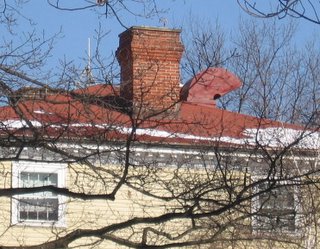
"The chimneys at Auschwitz took those too ill to be productive," Rubob said. "It was less a labor camp than an extermination camp. With the least bit of trouble they could have kept the inmates alive, but the imperative was to kill them. They were starved to death, and in winter they were provided with the thinnest possible coats, so they froze to death, too."
"And yet the odd thing is that they were allowed to go to the infirmary when they were ill, and there they were better fed than the rest of the inmates," Rubob continued. "Why weren't they sent to the gas chambers?"
"At one point, Levi writes, a rumor circulates that the inmates in the infirmary are going to be called out to be sent to the gas chambers. What was it called? They had a word for it. 'Selection' -- that's it. There was going to be a selection among the sick inmates, and Levi's group worried about it for many days. Everyone at the camp had a number, and so many had been eliminated that there were hardly any inmates in the camp left with numbers under 100,000. As it happened, only one inmate from the infirmary was selected after the rumor had spread among Levi's group, and Levi writes about him lying on his bunk, under a bare light bulb, knowing it was his last day on Earth. Levi, meanwhile, was quietly rejoicing that he wasn't picked."
"This world is too much with us sometimes, Rubob," Tine said. "My thoughts are with the sky today. I don't think of Auschwitz when I see chimneys. I don't even think of fireplaces and soot. I think only of the sky."

"Chimneys, like steeples, stand between earth and sky," Tine thought to herself. "They put everything in a new perspective somehow, remind us of our place under the sky -- even our place in the sky, in the divine order of things. They help us reach above and beyond ourselves."
But there was no denying the fact of the chimneys of Auschwitz, Tine thought. "In some ways," she thought, "Rubob grounds my thoughts, brings them back to earth."
"If a man will kick a fact out of the window, when he comes back he finds it again in the chimney corner," Ralph Waldo Emerson wrote.
Tine and Rubob turned down Garden street and passed a birdhouse nicely equipped with two chimneys.

As they passed the cemetery, Tine pointed out to Rubob that even some of the graves seemed to have chimney tops.

"What sort of smoke went up those chimneys?" Tine wondered, standing next to the granite monument. Life seemed an evanescent, tenuous sort of thing at times, its spirit and meaning as intangible as smoke, as impossible to grasp as air, its substance reducible to ashes. And yet there was that fire of life in us, and the sky arching over everything, Tine thought. There was something bright, good and lasting in life, too.
She thought of a line from Emerson: "Life is a festival only to the wise. Seen from the nook and chimney-side of prudence, it wears a ragged and dangerous front. "
"I've been weighed down too much by sickness," Tine said to Rubob -- "and too much by all my worries and cares. I've been living in my dark chimney corner, like Whittington in his scullery. Life is a festival only to the wise. "
"What's that, Tine?" Rubob asked.
"Emerson, Rubob," Tine said. "I haven't been taking part in the festival, have I?"
She thought of something that Bode Miller, the Olympic skiier, had said: "Anyone who isn't strong is left in a corner, no-one asks for their autograph, they are abandoned in the cold shadows. Those who win, however, become icons."
"We all need something to inspire us," Tine reflected. "I suppose I have chimneys to inspire me today."
She thought of Dick Whittington as he looked back over the rooftops of London from Highgate Hill and heard the bells calling out to him. From that moment, he didn't live his life in his master's scullery, on the chimney-side of prudence.

Dick Whittington, Lyceum Theatre
Whittington's dreams weren't simply "castles I used to build in air," as Frost writes in "The Kitchen Chimney," but well-constructed plans like sturdy, full-length chimneys, with views over the town.

On their way home, Tine and Rubob passed the Congregational Church, where workmen had left a shed that reminded Tine of Thoreau's cabin at Walden pond.

Tine recalled the story of the man who'd discovered Thoreau's cabin in 1945, Roland Robbins. He'd been intrigued by reports of a stone cairn marking the cabin site, and with "a pocket compass and a 98-cent G.I trench shovel" he began exploring around Walden Pond.
One of the things he found was the chimney foundation, and he wrote that working amidst it he "experienced for the first time the power of physical remains to captivate and capture both his imagination and the imagination of those around him. ... It also held immense promise for the future; in his mind there was no turning back." (http://www.uky.edu/AS/Anthropology/PAR/thoreau.htm)

Roland at Walden Pond, Thoreau's Cabin, 1946
Photo by Edwin Way Teale, Thoreau Society, Lincoln, Massachusetts
http://www.uky.edu/AS/Anthropology/PAR/thoreau.htm
It was the beginning of a professional career in historical archaeology for Robbins, and he became a pioneer in the field. Until he began work unearthing the remains of Thoreau's cabin, he'd operated "a small and successful window cleaning and painting business," he wrote, "but by heart I live with the unanswered questions to the... past."
The story had echoes of Dick Whittington's tale in it, Tine thought.
Robbins wanted to be more than an "expert at washing other people's windows and renovating other people's houses." The site of the cabin, Robbins was told, would "prove to be one of the world's greatest shrines."
All this from a chimney foundation, a few stone piers and a root cellar, Tine thought.

Replica of Thoreau's hut at Walden Pond.
Photo from:http://www.4peaks.com/fthwalden.htm
As Tine thought about Robbins' work in the woods by Walden Pond, she felt more rooted again in the earth, ready to bring her gaze down from the rooftops, to find a middle ground beneath earth and sky.

"Though I spends me time
In the ashes and smoke
In this 'ole wide world
There's no 'appier bloke
Up where the smoke is
All billered and curled'
'Tween pavement and stars
Is the chimney sweep world."
Tine had fallen behind Rubob as they made their way home, and she hurried to catch up with him.
"What were you doing dawdling back there, Tine?" Rubob asked.
"Spending me time in the ashes and smoke of this 'ole wide world, Rubob."
All in all, it was a very pleasant walk, Tine thought as she and Rubob reached their driveway.
"How long has it been since our last walk, Rubob?" Tine asked as they made their way down the driveway. "Has it been days or weeks, or even months?"
But Rubob, who was as lost in his thoughts as Tine was in her uncertain notions of time, didn't reply.
"Why are you trailing behind, Rubob?" Tine asked as they passed the open fields stretching up the hill in the old Bull Lot.
"You lead the way, Tine," Rubob said. "You're the shooter in our hunting party. I'd better be careful if a covey of quail breaks out of the brush behind us, or I'll get peppered with buckshot like poor old Harry Whittington."
Rubob had been absorbed in his newspaper for much of the morning, and his thoughts were still on the vice president's unfortunate hunting incident.
"Whittington -- wasn't there a Whittington in London?" Rubob asked.
"I don't know, Rubob," Tine replied.
"Dick Whittington, wasn't that it?" Rubob said. "He was a poor boy from Gloucestershire who walked to London to make his fortune."

"That's Gloss-ter-sher, Rubob -- not Glow-ster," Tine said.
"He becomes a scullery boy, and the cook makes his life so miserable that he decides to run away," Rubob continued. "But as he was leaving the city, he heard the bells of London ringing, and they seemed to him to say, 'Turn again Whittington, three times Lord Mayor of London.' So Dick returned to London, where, with the help of his cat, he makes his fortune."
"With his cat, Rubob?" Tine asked.
"As the story goes, Whittington had a cat to catch the mice in the attic where he lived. He sent his cat on one of his master's sailing voyages, and the cat was sold to a foreign king whose court was overrun with rats -- sold for a huge sum of gold. That's how Whittington began building his fortune. His adventures were the subject of pantomimes, and in one he's even portrayed as the 'Last Hope of the Universe’, who with his cat chases King Rat across the galaxy."
"That's a nice story, Rubob," Tine said, thinking to herself that it cheered her up a bit. Like Dick Whittington in his scullery in London, she'd been feeling miserable, weighed down by a long bout with the flu. Also on Tine's mind was the death of a high school friend, which she'd read about yesterday in the obituary pages. "We will all miss this kind and beautiful soul," the obituary had said. Tine was glad to be outside again in the fresh winter air. She let her gaze drift up to the rooftops, seeking release in the blue sky.
"Look, Rubob, chimney caps -- and not flimsy metal ones like ours, which get blown away in the wind," she said.

"And two chimneys, Tine," Rubob said. "I'd never noticed the two chimneys on that roof before."
"My thoughts are with the sky today," Tine said. "I can't be doing with all the sickness and trouble down here."

They passed another chimney with a well-built chimney cap, and Tine thought of a verse from Robert Frost's "The Kitchen Chimney":
"However far you must go for bricks,
Whatever they cost a-piece or a pound,
Buy me enough for a full-length chimney,
And build the chimney clear from the ground."
"They remind me of all the chimneys huddled on the rooftops in England -- of the view out the window of the bed-and-breakfast in Chester," Rubob said.
Tine thought of the chimneys in Dickens' London:
"The smoke hung sluggishly above the chimney-tops as if it lacked the courage to rise, and the rain came slowly and doggedly down, as if it had not even the spirit to pour."
It wasn't exactly Tine's view of chimneys, huddled together under a lowering sky.
"There's a garage with a chimney," Tine said. "Why do you suppose a garage would have a chimney, Rubob?"

"It's a mystery, Tine," Rubob said. "And why do you think that's one's built so high?"

"So it draws well," Tine said. "And to be close to the sky. It's had quite enough of the things of this world."
She thought of the poorly built "false" chimneys in Frost's poem:
"It's not that I'm greatly afraid of fire,
But I never heard of a house that throve
(And I know of one that didn't thrive)
Where the chimney started above the stove.
"And I dread the ominous stain of tar
That there always is on the papered walls,
And the smell of fire drowned in rain
That there always is when the chimney's false."
But the chimneys in the village inspired more uplifting thoughts in Tine. They seemed less concerned with smoke and fire than with the clear sky above, and they appeared to be as at home in the sky as the treetops.

The chimneys were like steeples, Tine thought as she and Rubob approached the Congregational church -- steeples built not just in worship of home and hearth, but in reverence for the sky.

"There's a perky one with a half-barreled black cap," Rubob said, looking at a chimney across the main thoroughfare.

'Tween pavement and stars is the chimney sweep world," Tine said, recalling the Mary Poppins song, "Chim Chim Cher-ee."
"Chim chiminey
Chim chiminey
Chim chim cher-ee!
A sweep is as lucky
As lucky can be.
"Chim chiminey
Chim chiminey
Chim chim cher-oo!
Good luck will rub off
when I shake 'ands with you,
Or blow me a kiss
And that's lucky too.
"Now as the ladder of life
'As been strung
You may think a sweep's
On the bottommost rung.
Though I spends me time
In the ashes and smoke
In this 'ole wide world
There's no 'appier bloke.
"Chim chiminey
Chim chiminey
Chim chim cher-ee!
A sweep is as lucky
As lucky can be."

"I'd like to live up there with the chimneys," Tine said, pointing to a cupola on the roof of the library at Miss Porter's School. "That would be just fine for me."

"Or how about up there with that chimney, safely tucked between two windows, with a pleasant view of the sky?" she said, looking at the rooftop of a dorm at Miss Porter's School.

"Or there, in my own tower, far from the troubles of the world," Tine said.

"When I think of chimneys, I can't help thinking of Auschwitz," Rubob said.
Tine stopped in her tracks and said, "Auschwitz? That's what you think of when you see chimneys?"
"It's only because I've just finished Primo Levi's memoirs on Auschwitz, and that's what they called the crematorium: 'the Chimney.'"
Tine was struck by how different her notion of chimneys was than Rubob's.

"The chimneys at Auschwitz took those too ill to be productive," Rubob said. "It was less a labor camp than an extermination camp. With the least bit of trouble they could have kept the inmates alive, but the imperative was to kill them. They were starved to death, and in winter they were provided with the thinnest possible coats, so they froze to death, too."
"And yet the odd thing is that they were allowed to go to the infirmary when they were ill, and there they were better fed than the rest of the inmates," Rubob continued. "Why weren't they sent to the gas chambers?"
"At one point, Levi writes, a rumor circulates that the inmates in the infirmary are going to be called out to be sent to the gas chambers. What was it called? They had a word for it. 'Selection' -- that's it. There was going to be a selection among the sick inmates, and Levi's group worried about it for many days. Everyone at the camp had a number, and so many had been eliminated that there were hardly any inmates in the camp left with numbers under 100,000. As it happened, only one inmate from the infirmary was selected after the rumor had spread among Levi's group, and Levi writes about him lying on his bunk, under a bare light bulb, knowing it was his last day on Earth. Levi, meanwhile, was quietly rejoicing that he wasn't picked."
"This world is too much with us sometimes, Rubob," Tine said. "My thoughts are with the sky today. I don't think of Auschwitz when I see chimneys. I don't even think of fireplaces and soot. I think only of the sky."

"Chimneys, like steeples, stand between earth and sky," Tine thought to herself. "They put everything in a new perspective somehow, remind us of our place under the sky -- even our place in the sky, in the divine order of things. They help us reach above and beyond ourselves."
But there was no denying the fact of the chimneys of Auschwitz, Tine thought. "In some ways," she thought, "Rubob grounds my thoughts, brings them back to earth."
"If a man will kick a fact out of the window, when he comes back he finds it again in the chimney corner," Ralph Waldo Emerson wrote.
Tine and Rubob turned down Garden street and passed a birdhouse nicely equipped with two chimneys.

As they passed the cemetery, Tine pointed out to Rubob that even some of the graves seemed to have chimney tops.

"What sort of smoke went up those chimneys?" Tine wondered, standing next to the granite monument. Life seemed an evanescent, tenuous sort of thing at times, its spirit and meaning as intangible as smoke, as impossible to grasp as air, its substance reducible to ashes. And yet there was that fire of life in us, and the sky arching over everything, Tine thought. There was something bright, good and lasting in life, too.
She thought of a line from Emerson: "Life is a festival only to the wise. Seen from the nook and chimney-side of prudence, it wears a ragged and dangerous front. "
"I've been weighed down too much by sickness," Tine said to Rubob -- "and too much by all my worries and cares. I've been living in my dark chimney corner, like Whittington in his scullery. Life is a festival only to the wise. "
"What's that, Tine?" Rubob asked.
"Emerson, Rubob," Tine said. "I haven't been taking part in the festival, have I?"
She thought of something that Bode Miller, the Olympic skiier, had said: "Anyone who isn't strong is left in a corner, no-one asks for their autograph, they are abandoned in the cold shadows. Those who win, however, become icons."
"We all need something to inspire us," Tine reflected. "I suppose I have chimneys to inspire me today."
She thought of Dick Whittington as he looked back over the rooftops of London from Highgate Hill and heard the bells calling out to him. From that moment, he didn't live his life in his master's scullery, on the chimney-side of prudence.

Dick Whittington, Lyceum Theatre
Whittington's dreams weren't simply "castles I used to build in air," as Frost writes in "The Kitchen Chimney," but well-constructed plans like sturdy, full-length chimneys, with views over the town.

On their way home, Tine and Rubob passed the Congregational Church, where workmen had left a shed that reminded Tine of Thoreau's cabin at Walden pond.

Tine recalled the story of the man who'd discovered Thoreau's cabin in 1945, Roland Robbins. He'd been intrigued by reports of a stone cairn marking the cabin site, and with "a pocket compass and a 98-cent G.I trench shovel" he began exploring around Walden Pond.
One of the things he found was the chimney foundation, and he wrote that working amidst it he "experienced for the first time the power of physical remains to captivate and capture both his imagination and the imagination of those around him. ... It also held immense promise for the future; in his mind there was no turning back." (http://www.uky.edu/AS/Anthropology/PAR/thoreau.htm)

Roland at Walden Pond, Thoreau's Cabin, 1946
Photo by Edwin Way Teale, Thoreau Society, Lincoln, Massachusetts
http://www.uky.edu/AS/Anthropology/PAR/thoreau.htm
It was the beginning of a professional career in historical archaeology for Robbins, and he became a pioneer in the field. Until he began work unearthing the remains of Thoreau's cabin, he'd operated "a small and successful window cleaning and painting business," he wrote, "but by heart I live with the unanswered questions to the... past."
The story had echoes of Dick Whittington's tale in it, Tine thought.
Robbins wanted to be more than an "expert at washing other people's windows and renovating other people's houses." The site of the cabin, Robbins was told, would "prove to be one of the world's greatest shrines."
All this from a chimney foundation, a few stone piers and a root cellar, Tine thought.

Replica of Thoreau's hut at Walden Pond.
Photo from:http://www.4peaks.com/fthwalden.htm
As Tine thought about Robbins' work in the woods by Walden Pond, she felt more rooted again in the earth, ready to bring her gaze down from the rooftops, to find a middle ground beneath earth and sky.

"Though I spends me time
In the ashes and smoke
In this 'ole wide world
There's no 'appier bloke
Up where the smoke is
All billered and curled'
'Tween pavement and stars
Is the chimney sweep world."
Tine had fallen behind Rubob as they made their way home, and she hurried to catch up with him.
"What were you doing dawdling back there, Tine?" Rubob asked.
"Spending me time in the ashes and smoke of this 'ole wide world, Rubob."
All in all, it was a very pleasant walk, Tine thought as she and Rubob reached their driveway.
<< Home